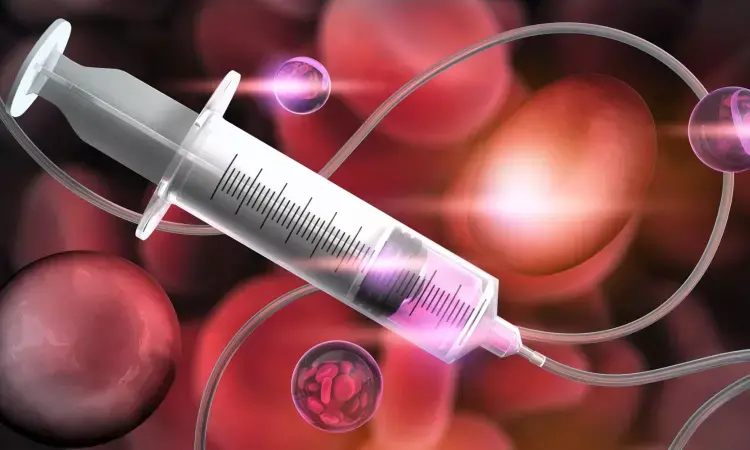- Home
- Medical news & Guidelines
- Anesthesiology
- Cardiology and CTVS
- Critical Care
- Dentistry
- Dermatology
- Diabetes and Endocrinology
- ENT
- Gastroenterology
- Medicine
- Nephrology
- Neurology
- Obstretics-Gynaecology
- Oncology
- Ophthalmology
- Orthopaedics
- Pediatrics-Neonatology
- Psychiatry
- Pulmonology
- Radiology
- Surgery
- Urology
- Laboratory Medicine
- Diet
- Nursing
- Paramedical
- Physiotherapy
- Health news
- Fact Check
- Bone Health Fact Check
- Brain Health Fact Check
- Cancer Related Fact Check
- Child Care Fact Check
- Dental and oral health fact check
- Diabetes and metabolic health fact check
- Diet and Nutrition Fact Check
- Eye and ENT Care Fact Check
- Fitness fact check
- Gut health fact check
- Heart health fact check
- Kidney health fact check
- Medical education fact check
- Men's health fact check
- Respiratory fact check
- Skin and hair care fact check
- Vaccine and Immunization fact check
- Women's health fact check
- AYUSH
- State News
- Andaman and Nicobar Islands
- Andhra Pradesh
- Arunachal Pradesh
- Assam
- Bihar
- Chandigarh
- Chattisgarh
- Dadra and Nagar Haveli
- Daman and Diu
- Delhi
- Goa
- Gujarat
- Haryana
- Himachal Pradesh
- Jammu & Kashmir
- Jharkhand
- Karnataka
- Kerala
- Ladakh
- Lakshadweep
- Madhya Pradesh
- Maharashtra
- Manipur
- Meghalaya
- Mizoram
- Nagaland
- Odisha
- Puducherry
- Punjab
- Rajasthan
- Sikkim
- Tamil Nadu
- Telangana
- Tripura
- Uttar Pradesh
- Uttrakhand
- West Bengal
- Medical Education
- Industry
Ferric carboxymaltose injection receives FDA approval for iron deficiency anaemia in heart failure

USA: The US Food and Drug Administration (FDA) has expanded the indication for ferric carboxymaltose injection (Injectafer) for treating iron deficiency in adults with NYHA (New York Heart Association) class II/III heart failure (HF). With this, Ferric carboxymaltose has become the first form of intravenous iron replacement to earn an FDA indication for heart failure.
Injectafer (Daiichi Sankyo/American Regent) has already been approved for iron deficiency anaemia in adult patients resistant or intolerant to oral iron or those with non-dialysis-dependent CKD (chronic kidney disease). The new indication to improve exercise capacity includes iron deficiency in adult patients with NYHA class II/III HF.
FDA's new indication in heart failure was based on data from the CONFIRM-HF trial. The randomized controlled trial evaluated the safety and efficacy of ferric carboxymaltose injection in adults with chronic HF and iron deficiency. The study results revealed that treatment with ferric carboxymaltose injection significantly improved exercise capacity compared with placebo in iron-deficient patients with heart failure.
There were no new safety signals. The most common treatment-emergent adverse events were nausea, headache, injection site reactions, hypertension, dizziness, and hypophosphatemia.
According to the manufacturer, American Regent, ferric carboxymaltose injection has been studied in more than 40 clinical trials that included more than 8800 patients worldwide and has been approved in 86 countries.
International guidelines already recommend screening for iron deficiency in heart failure and support intravenous iron repletion: the most recent European Society of Cardiology heart failure guidelines (but not the most recent US guidelines) specify that intravenous ferric carboxymaltose can be considered to prevent further heart failure admissions in symptomatic patients recently hospitalized.
“This new indication for Injectafer marks the first and only FDA approval of an IV iron replacement therapy for adult patients with heart failure,” American Regent Chief Medical Officer Ravi Tayi, MD, MPH, said in the press release. “This latest approval continues to build on the effective and proven use of Injectafer for adult and pediatric patients with iron deficiency anaemia, and now for adult patients with heart failure who have iron deficiency.”
Dr Kamal Kant Kohli-MBBS, DTCD- a chest specialist with more than 30 years of practice and a flair for writing clinical articles, Dr Kamal Kant Kohli joined Medical Dialogues as a Chief Editor of Medical News. Besides writing articles, as an editor, he proofreads and verifies all the medical content published on Medical Dialogues including those coming from journals, studies,medical conferences,guidelines etc. Email: drkohli@medicaldialogues.in. Contact no. 011-43720751


